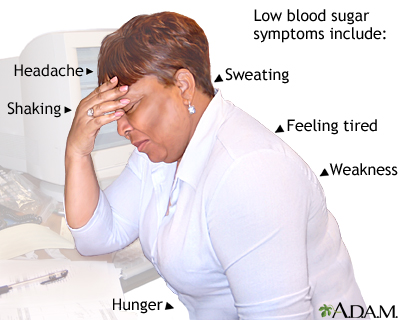Preparing for surgery when you have diabetes
You may need surgery for a diabetes related condition. Or, you may need surgery for a medical problem that is unrelated to your diabetes. Your diabetes may increase your risk for problems during or after your surgery, such as:
- Infection after surgery (especially at the site of the surgery)
- Healing more slowly
- Fluid, electrolyte, and kidney problems
- Heart problems
Images

Presentation

I Would Like to Learn About:
Before Surgery
Work with your health care provider to come up with the safest surgery plan for you.
Focus more on controlling your diabetes during the days to weeks before surgery. Stop using tobacco during this time, ideally 6 weeks before surgery.
Your provider will do a medical exam and talk to you about your health.
- Tell your provider about all the medicines you are taking.
- If you take metformin, talk to your provider about stopping it. Sometimes, it should be stopped 48 hours before and 48 hours after surgery to decrease the risk of a problem called lactic acidosis.
- If you take other types of diabetes medicines, follow your provider's instructions about the medicine before surgery. Medicines called SGLT2 inhibitors ("flozins") can increase the risk of blood sugar problems related to surgery. Tell your provider if you are taking one of these medicines.
- If you take insulin, ask your provider what dose you should take the night before or the day of your surgery. Make sure your provider knows whether you have type 1 or type 2 diabetes as the recommendations to adjust insulin are different.
- Your provider may have you meet with a dietitian, or give you a specific meal and activity plan to try to make sure your blood sugar is well-controlled for the week prior to your surgery.
- Some surgeons will cancel or delay surgery if your blood sugar is high when you arrive at the hospital for your surgery.
Surgery is riskier if you have diabetes complications. So talk to your provider about your diabetes control and any complications you have from diabetes. Tell your provider about any problems you have with your heart, kidneys, or eyes, or if you have loss of feeling in your feet. The provider may run some tests to check the status of those problems.
During Surgery
You may do better with surgery and get better faster if your blood sugar is controlled during surgery. So, before surgery, talk to your provider about your blood sugar target level during the days before your operation.
During surgery, insulin may be given by the anesthesiologist. You will meet with this provider before surgery to discuss the plan to control your blood sugar during the operation.
If you are taking insulin for your diabetes, ask to schedule your surgery early in the morning to decrease blood sugar problems related to prolonged fasting.
After Surgery
You or your nurses should check your blood sugar often. You may have more trouble controlling your blood sugar because you:
- Have trouble eating
- Are vomiting
- Are stressed after surgery
- Are less active than usual
- Have pain or discomfort
- Are given medicines that increase your blood sugar
Expect that you may take more time to heal because of your diabetes. Be prepared for a longer hospital stay if you are having major surgery. People with diabetes often have to stay in the hospital longer than people without diabetes.
Watch for signs of infection, such as a fever, or an incision that is red, hot to touch, swollen, more painful, or oozing.
Prevent bedsores. Move around in bed and get out of bed frequently. If you have less feeling in your toes and fingers, you may not feel if you are getting a bed sore. Make sure you move around.
After you leave the hospital, it is important for you to work with your provider to make sure your blood sugar continues to be well controlled.
When to Call Your Doctor
Contact your provider if:
- You have any questions about surgery or anesthesia
- You are not sure what medicines or doses of your medicines you should take or stop taking before surgery
- You think that you have an infection
References
American Diabetes Association. 16. Diabetes Care in the Hospital: Standards of Care in Diabetes-2023. Diabetes Care. 2023;46(Suppl 1):S267-S278. PMID: 36507644 pubmed.ncbi.nlm.nih.gov/36507644/.
Zaydfudim VM, Hu Y, Adams RB. Principles of preoperative and operative surgery. In: Townsend CM Jr, Beauchamp RD, Evers BM, Mattox KL, eds. Sabiston Textbook of Surgery. 21st ed. St Louis, MO: Elsevier; 2022:chap 10.
BACK TO TOPReview Date: 5/13/2023
Reviewed By: Sandeep K. Dhaliwal, MD, board-certified in Diabetes, Endocrinology, and Metabolism, Springfield, VA. Also reviewed by David C. Dugdale, MD, Medical Director, Brenda Conaway, Editorial Director, and the A.D.A.M. Editorial team.

Health Content Provider
06/01/2025
|
A.D.A.M., Inc. is accredited by URAC, for Health Content Provider (www.urac.org). URAC's accreditation program is an independent audit to verify that A.D.A.M. follows rigorous standards of quality and accountability. A.D.A.M. is among the first to achieve this important distinction for online health information and services. Learn more about A.D.A.M.'s editorial policy, editorial process and privacy policy. A.D.A.M. is also a founding member of Hi-Ethics. This site complied with the HONcode standard for trustworthy health information from 1995 to 2022, after which HON (Health On the Net, a not-for-profit organization that promoted transparent and reliable health information online) was discontinued. |
The information provided herein should not be used during any medical emergency or for the diagnosis or treatment of any medical condition. A licensed medical professional should be consulted for diagnosis and treatment of any and all medical conditions. Links to other sites are provided for information only -- they do not constitute endorsements of those other sites. © 1997- 2024 A.D.A.M., a business unit of Ebix, Inc. Any duplication or distribution of the information contained herein is strictly prohibited.
